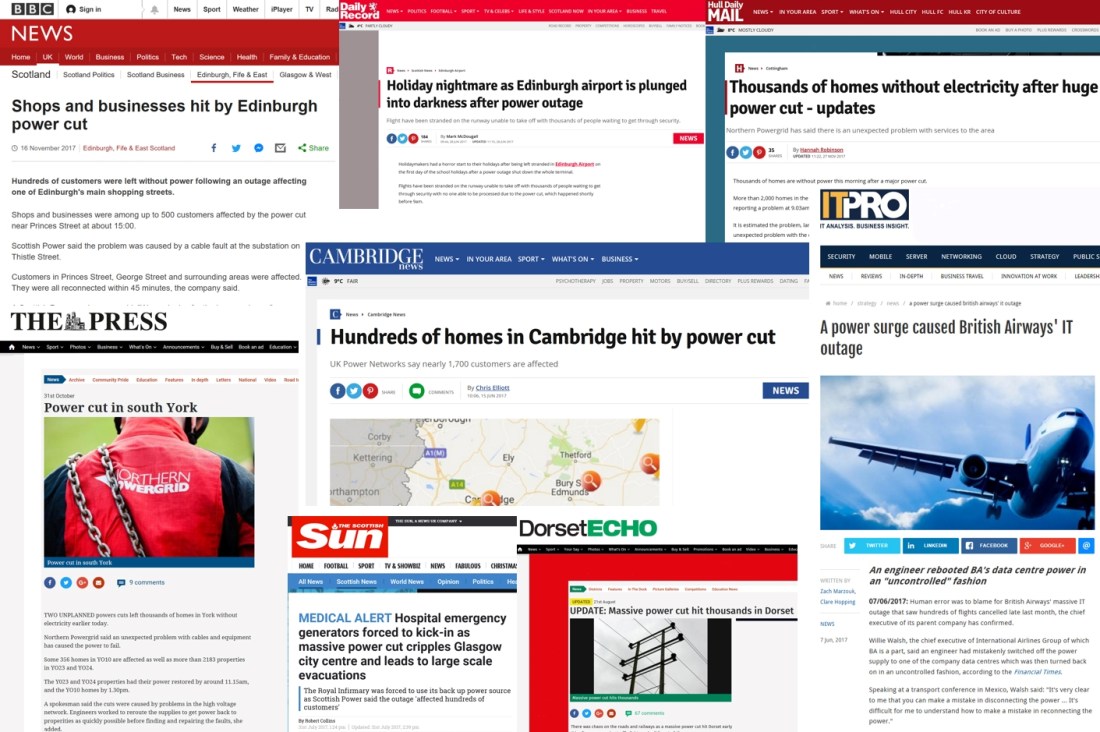National Grid’s outlook for the coming winter is somewhat more positive in capacity terms than in previous winters, with a capacity margin of 6.2 GW or 10.3%.
“We are confident that we have the right products and strategy in place to help us to balance the system, even under colder conditions than we have experienced in recent years,” – National Grid.
This is what comes to mind for many when security of supply is mentioned – does the system as a whole have the capacity to meet peak demand. However, for businesses, security of supply takes on a very different meaning when any interruption can affect operations – this is particularly critical for health organisations where power failures could be fatal.
The need for high levels of reliability drive many businesses to install on-site back-up generation to ensure they are never without power, however there are many businesses for whom 100% reliability is less critical, and therefore have no back-up generation in place. Reliability and resilience issues are expected to grow as the amount of intermittent generation on the grid grows and the amount of inertia falls.
How common are power outages?
Most outages are local, and except for those relating to major weather events, tend to only be locally reported. A brief news search of recent power outages yielded dozens of such reports, often affecting thousands of customers at a time.
Eaton Ltd, a provider of power management services, produces a power blackout tracker, illustrating the instances and causes of power outages. The most common cause is human error, but almost a third of outages were unexplained. Other factors such as animal activity and metal theft are also responsible for outages, the most recent Blackout Tracker UK Annual Report from Eaton describes the impact of metal theft:

“The experience of the auto company [car parts manufacturer, Nifco Inc] was highlighted by independent charity Crimestoppers, which, together with Northern Powergrid, launched a campaign to highlight the damages these thefts can cause.
The electricity provider reported 566 separate incidents of metal theft on its network last year, with thieves targeting valuable copper wire. Nifco, which experienced seven attacks at its factory, revealed that each incident can cost the firm up to £10,000 an hour in lost productivity as plant machines, shop floor workers and office staff are plunged into darkness.”

Under the RIIO framework, Ofgem monitors the reliability of electricity supplies.
These charts show that at the both the transmission and distribution levels, network companies have outperformed their reliability targets, however, the data show that on average customers lose more than 30 minutes of supply each year.
These data exclude short interruptions of under 3 minutes’ duration, since Ofgem does not require these to be reported (a decision dating back to 2013). Short interruptions can still be problematic for businesses – clocks, security systems and so on need to be re-set, as anyone who has come home to the clocks on appliances blinking can attest.


Impact of power outages
That is not to say that short outages cannot be highly damaging both to corporate profits, and more importantly, the safety of employees. In October, Centrica published a report into electricity market resilience, claiming that UK businesses face an increased risk of power-related failures that could “endanger employees and profit margins”.

For its report, Centrica surveyed more than 300 businesses in various industries across the UK and Ireland. The key findings were:
- Power failures do not have to be long to have a lasting impact on their operations – one in ten of those surveyed said that just one hour’s downtime would be enough to have a “catastrophic” impact on their operation;
- More than 80% of those surveyed said they had experienced at least one power failure in the last year, with more than half (52%) considering it likely the same would occur again;
- Almost 1 in 3 businesses surveyed attributed lost revenue to power outages;
- 11% of businesses said employees have been endangered as a result of energy-related failures;
- 27% of businesses expected energy-related failures to become more frequent over the next five years – 4% believed that the number of failures will increase significantly;
- Businesses that experienced an energy-related failure in the past 12 months reported an average of 12 failures in total.
According to the report, 23% of businesses suffered equipment damage whilst 14% reported losing inventory due to power outages. 18% of businesses reported that outages damaged their brand, with 19% believing that relationships with individual customers were negatively affected as a result. More worrying is the fact that 11% of businesses said their employees have been put in dangerous or life-threatening situations due to energy-related failures.
Looking differently at security of supply
The Centrica survey is interesting as it provides greater insight into the impact of power outages on businesses than the RIIO data collected by Ofgem. The safety implications are particularly worrying – something that is far from evident from RIIO reporting.
The RIIO data also do not cover short interruptions where power is restored in under 3 minutes – given the number of businesses reporting issues with relatively short outages, it would be interesting to understand both the frequency and impact of such outages – in an increasingly networked, data-driven world the impact of such disruptions could become much more significant, including for domestic consumers.
At a time when the electricity system is becoming more difficult to manage, and the impact of outages is potentially growing, it may be time to think differently about security of supply. Collecting all the relevant data may be a good place to start.







Living in the contry, we have aways had low security of grid supply so have adapted.
3 seperate forms of heating & cooking – gas, oil, solid that don’t require electricity to run.
An emergancy battery powered LED lighting system that can be recharged (via a charging line through letterbox from a car) or from the 5kva genset when running washing machine, fridges & freezers.
TV, computers etc tap into lighting system for recharge.
Simples !
It’s a great choice: gas/oil/wood for heating and cooking, plus car battery for low power back-up, plus separate genset for larger loads…..or a properly reliable electricity supply!
I rather suspect that it London had the same levels of reliability that some parts of the country experience, then security of supply would be thought of in significantly different terms…
ON a different tack, I have many times seen studies showing that the grid can cope with the intermittency of renewables, and meet the slew rates and peak outputs demanded of its fossil, nuclear and hydro generators, but no one (apart from myself) has ever tried to show at what cost…
There are signs that that questions is finally being addressed. Analysed holistically, what is the overallcost of balancing intermittent renewable operation, in terms of dollars per MWh, compared with the overall reduction in CO2?
And how much lower is the cost of achieving similar reductions, using e.g. nuclear?
The answer is of course that even at the absurd cost of Hinkley Point nuclear is still massively better CO2 reduction per dollar, than solar or wind.
I agree we need more nuclear…I’m just not convinced EPR is the answer. Given where we are now, I would prefer ABWR as we know they work / can be built….I’ll be writing something on this topic again soon!
No disagreement here. In essence once you throw out the Chernobyl style reactors that have to be actively managed, any of the remaining basic technologies can be made more than safe enough.
Fukushima was not the disaster its made out to be. And if they hadn’t been so coy about venting hydrogen tainted with slight radioactivity, there would have been no explosion.
And in fact the greater danger was from the spent fuel ponds, overloaded because no proper waste disposal policy was in operation.
With the the correct political will and a clear policy on waste and fuel reprocessing and freedom to set sane, rather than punitive safety regimes, nuclear would be cost effective and very very safe indeed.